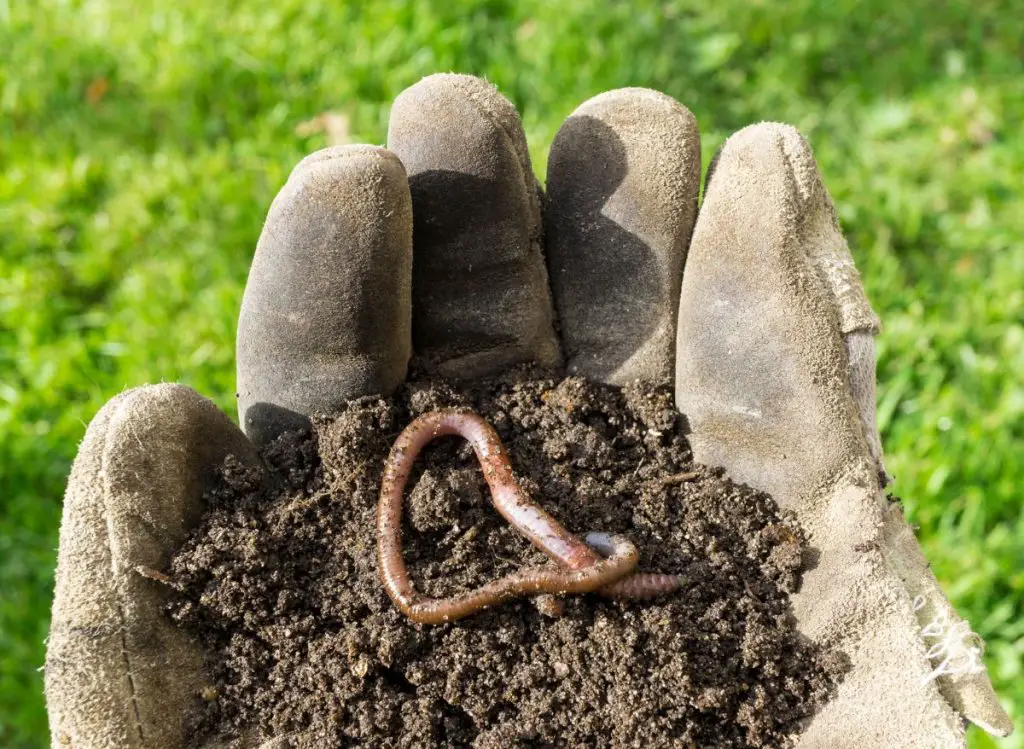This post contains affiliate links.

Earthworms are gardeners’ best friends as they help keep soil healthy and aerated. However, too many earthworms can cause problems in the garden if not controlled.
In general, a large population of earthworms can cause excessive soil castings that can smother plants, reduce water quality, and promote weed growth. If you’re dealing with too many earthworms in your garden, worry not.
Earthworms are most problematic on tees, greens, and short-mowed Golf courses with heavy soils. Earthworms are generally beneficial in home lawns and most turfgrass areas because they mix the soil and help disintegrate thatch (Source: Michigan State University)
Read on to explore helpful tips and tricks on how to remove earthworms from soil effectively and safely. If you wonder how to get rid of worms in potted plants, I wrote a whole article that I encourage you to read.
1- Remove Food Sources
Earthworms thrive on organic matter such as leaves, grass clippings, and kitchen scraps. If you have too many earthworms in your soil, it might be because you are feeding them too much.
The good news is that by removing food sources, you can discourage earthworms from breeding excessively. Avoid adding new compost or similar materials, at least for a while.
Another option is to till your soil frequently, as earthworms don’t like the disturbance caused by heavy machinery. You can also try removing worms manually by collecting them by hand and relocating them to another area.
2- Solarization
Another effective method for removing earthworms from your soil is polarization, involving covering your soil with a clear plastic sheet, which will trap heat and raise the temperature of the soil to levels that are lethal for earthworms.
Solarization kills the vegetation underneath by blocking access to water and heating the soil, according to experts from the University of Minnesota.
Solarization can take anywhere from a few weeks to several months, but it’s completely safe and doesn’t require the use of any harmful chemicals.
3- Soil Sterilization
If you want to sterilize your soil and start over from scratch completely, soil sterilization is the way to go.
Soil sterilization involves heating your soil to temperatures high enough to kill all organisms present, including earthworms. While this method is effective, it is also quite costly and time-consuming, and it’s not recommended for small-scale gardening.
If you are considering soil sterilization to control Earthworms in your garden soil, I encourage you to watch this helpful video.

4- Change Soil Conditions
Earthworms prefer slightly acidic soils. If your garden soil is too acidic, consider adding some lime to raise the pH.
However, remember that earthworms can adjust to pH 5–8, and some earthworm species can tolerate even more acidic soils (Source: USDA)
Also, if your soil tends to dry out too quickly, consider adding organic matter to increase moisture retention. Generally, changing soil conditions can make it less attractive to earthworms and reduce their numbers.
5- Limit Watering
While earthworms need moisture to survive, too much water can drive them to the surface and cause problems. To effectively control Earthworms in your garden soil, I encourage you to limit the amount of water you use when watering plants, especially if your garden soil is already wet.
It is also recommended to avoid over-irrigation or watering at night, as this can lead to excessive moisture buildup in the soil.
6- Use Natural Repellants
Some natural substances can repel earthworms, such as vinegar, neem oil, and garlic juice. Mix any of these repellants with water and apply them to the soil surface or use them as a foliar spray.
These natural repellents won’t harm earthworms but will discourage them from staying or breeding in your garden soil.
I suggest you watch this video if you are looking for ways to make your own DIY Neem Oil and Garlic Spray as a Natural Garden Pesticide
7- Prevention
Once you have successfully removed earthworms from your soil, I believe that the best way to prevent them from returning is to maintain good soil health, which means ensuring proper drainage, minimizing soil compaction, and avoiding over-fertilization.
When you do fertilize your soil, I suggest you use organic materials such as compost or manure instead of chemical fertilizers, as these will help promote healthy soil and discourage earthworms from taking up residence.
8- Apply Chemical Treatments
If the all above measures don’t work, you can consider using chemical treatments to control earthworms. However, I recommend you choose a product that is environmentally friendly and safe to use in your garden.
Look for a product that targets earthworms specifically and follow the manufacturer’s instructions carefully. There are several commercial products available that will kill earthworms in your soil, such as carbaryl or methiocarb (Source: Michigan State University)
Again, I suggest you use chemical treatments to control earthworms carefully and only as a last resort, as they can also harm other beneficial insects and microorganisms in your soil.

What to read next:
- Scotts Grubex Vs. Bayer Grub Control: Which Should You Choose?
- Best Ways To Prepare Soil For Planting Vegetables.
- Can You Put Coffee Grounds In Potted Plants? (Here’s the truth!)
Wrapping Up
Earthworms are essential for maintaining a healthy garden because they help aerate the soil, promote nutrient cycling, and improve soil structure. However, sometimes they can become too abundant, causing harm to other plants and negatively impacting soil health.
I believe that by following the tips and tricks outlined in this article, you can control earthworm populations without harming the environment or compromising the health of your garden.
Remember, healthy soil is the foundation of a thriving garden, and by working together with earthworms, you can create a beautiful and productive space for all your gardening needs.

